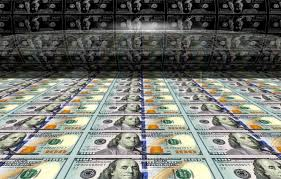HOME
ARTICLE
PAST ARTICLES
CONTACT JUST A TRILLION


Trillion like a billion is a number that is so large that it is perhaps more appropriately used in the field of astronomy when determining the distance between stars and planets, or physics when talking about atoms, protons, and neutrons. However, when trillion is used in the area of money and finance, specifically in the context of repaying debts and/or reducing deficits that run into the tens or hundreds of trillions of dollars, then we are talking lunacy. If and when the day ever comes when there's a debate about repaying debts or reducing deficits that run into the quadrillions of dollars, then we will know we have entered into the twilight zone of money madness.
The current financial crisis has given rise to many things such as excessive central bank interventions into the financial markets in general and the forex markets in particular, resulting in market disruption and distortions that have led to misallocation of capital, zero and negative interest rates, increased risk taking, extreme market volatility, loss of true price discovery, inadequate liquidity, all fueled by fear, greed, uncertainty, and confusion.
In the above context the word trillion seems to have lost its meaning, as if what it represents in terms of an amount of money is no big deal, something to be discussed calmly over a cup of coffee. If a trillion dollars was just an amount and figure entered into a computer, having no positive or negative affect or consequence then there would be no problem, but that's not the way it is, the way things work.
The unfortunate reality is that, in all cases, when entering amounts into a computer that represents tens or hundreds of billions or trillions of dollars, euros, yen, yuan, pounds etc., results in more than a mere electronic transfer of funds from one account to another; the creation and movement of such large sums of money often causes more than a financial "hiccup" to occur, believe me, that amount of money when spent, saved, or accumulated as debt, or used to pay down debt will cause things to happen, both good and bad.
Numb to Numbers

You can get away with a lot when nobody knows or understands what you are doing, you can really misbehave, lie, cheat, and steal and nobody (or very few) would be the wiser. And truth be told, this is perhaps one key reason why governments i.e. politicians and central bankers around the world have been so embolden and successful in running up their national debt and deficit numbers to such crazy and absurd levels, because most people don't understand monetary and fiscal policies nor have a clue as to how it actually affects them, except perhaps on a very shallow level. It is no wonder therefore, when it comes to monetary and fiscal policy that, ignorance of the masses can be a government and central bankers best friend. I'm referring to an ignorance borne out of apathy, a type of apathy which occurs when a person is preoccupied with other more immediate and pressing concerns, such as coming up with the money to pay a medical bill, daycare, or the rent.
So it's understandable to see why an immediate disconnect occurs in the mind of a person who is told the government is in debt by trillions of dollars. In their mind that's a government problem, moreover, you're talking about an amount of money that they can't even conceive of, let alone relate to, after all, it's certainly not in the realm of anyone's experience to have ever earned a trillion dollars, or having won it by playing the lottery. And so it is that, after awhile, people simply become numb to numbers, especially when those numbers become too large to comprehend. To add emphasis as to just how much a trillion dollars is, let's look at what can be done with just one hundred billion dollars, and after reading what can be done with that amount of money there then should be a greater appreciation for what can potentially be done with one trillion dollars, let alone twenty-seven trillion.
1) It would take a little over 10,000 years to exhaust one hundred billion dollars at $25k per day.
2) It would take 274 years to exhaust one hundred billion dollars at a spending rate of one million dollars per day.
3) A monthly rent or mortgage payment of $2,500 can be covered by one hundred billion dollars for a little over 3.3 million years!
4) One hundred billion dollars can continuously cover an annual $100k college tuition for one million years!
5) With one hundred billion dollars a $1,700 monthly medical bill can be continuously covered over and over again for 4.5 million years! or a 25k monthly medical bill for 2.5 million years!
6) A person can purchase two hundred and fifty thousand houses costing 400k each with one hundred billion dollars.
7) 2.5 million vehicles costing $40k each can be purchased.
8) A person can take an annual $10k vacation for the next 10 million years! before exhausting one hundred billion dollars.
Conditioning of the Mind

As was said earlier, ignorance of the masses can be a government and central banker's best friend, but also a lot can be said about the conditioning of the mind. By creating an environment and circumstances through manipulation, then reinforcing both with lies, images, misrepresentations, misleading statements and stories, half-truths, misinformation, or otherwise holding back information can go a long way in duping people into accepting as normal or true something that is not.
Conditioning the public's mind by presenting it with a string of situations and recurring stories and news events that desensitizes them, in this particular instance to large dollar amounts, such as one company aquiring another, or the mega-merger of two corporate behemoths involving billions of dollars, companies having market values nearing, or having reached the trillion-dollar mark. Government departments or agencies wasting hundreds or thousands of dollars in payments to contractors for over inflated prices and costs for goods and/or services, mailing out millions of duplicate letters and notices to recipients costing taxpayers millions of dollars in waste, or social programs requiring tens or hundreds of billions of dollars a year to operate etc., over and over again all this and more tends to dull the public's senses and sensitivity to such large dollar amounts. This is one key reason why you will always hear politicians on the local, state, and federal level constantly calling for more spending on a host of things, because they too have become numb to numbers due to the conditioning of their minds.
For example, where is the shock and awe, the gasp of disbelief, the look of amazement, the shriek of horror when one sees the U.S. deficit at twenty-seven trillion dollars ($27,000,000,000,000), which by the time this is read it will be moving higher on its way to thirty trillion. I guess such an amount doesn't matter until it does, in the meantime, we simply stretch out our arms and with a big wide yawn we all turn over and go back to sleep, as we say, wake me up when the alarm sounds. Sadly, that pretty much sums up where we are right now as a nation.
Again, it's about the conditioning of our minds as it relates to very large figures expressed in multiple millions, billions, and trillions of any currency, not just dollars. One key reason why we as citizens, taxpayers, and investors have gone from point A of being shocked by humungous dollar amounts to point Z of showing little to no shock at all has a lot to do with our acceptance of the situation. We've come to accept these numbers as normal. But it's particularly important during this financial crisis that more people sit up and give serious thought and attention to these large numbers, and what happens when they can no longer be sustained. What is the plan when large amounts of borrowed and spent money finally do matter, when things start going awry and begin to unravel in a very bad way?
Questioning the Numbers and the Narrative
The Federal deficit and spending are both currently running into multiple billions and trillion of dollars each year.
The central bank i.e. the Federal Reserve has and is printing billions and trillions of dollars to keep the U.S. financial
system afloat.
Student, credit card, and auto loan debt have all surpassed the trillion-dollar mark, this amount will come down as people begin defaulting on their loans and/or in the case of student loans are forgiven them by the government, time will tell.
The above are all large amounts, so at this point one may be asking the question, if the above things are true why then is the public not in a panic? Two reasons were already given; being numb to numbers and the conditioning of the mind, but a more blunt answer is that most people just don't care, or at least not enough people. Yeah, it's too bad your neighbor was robbed, or your co-worker was laid off, but it didn't happen to you, you may feel sorry for the other person, but again it didn't happen to you, it didn't affect you directly.
What do you care if there is a student loan crisis, you're not in school, but what if your son or daughter are and what if the government and other lenders drastically cut back on providing loans to them, and what if because of this your child had to drop out of college, or what if you and/or your child now had to bear much more of the cost of their education. Suddenly a student loan crisis becomes your crisis and those big numbers now mean something to you.
It's been said that if something doesn't make sense then it's probably not true, and as it relates to big numbers, if the numbers are true then perhaps the narrative surrounding those numbers is false. At this point let me put on my tin foil hat, because what I'm about to say will undoubtedly fall under the category of "conspiratorial theory," and what I say is this, that the United States is facing a concealed, undeclared financial crisis that is being covered up in many clever ways, so much so, that the crisis goes unrecognized by many government officials, business leaders and the general public. Unwelcome and ignored in this environment are numbers and statistics that expose the sick condition of the economy and financial markets, instead the public is spoon-fed a narrative that is skewed in favor of positive financial news and data that indicates all is well, or at the least not that bad. Now with my tin foil hat still on let me share the following information:
Benefiting from the Numbers
There's a silent complicity on the part of many businesses, elected officials, government
bureaucrats, minority groups, the rich and the poor who all benefit in different ways from the
billions and trillions of dollars in government largess, they've all experienced what all that
money can buy and do for them, throw in tax credits, tax breaks, and deductions and you make a lot of
people very happy, and you make a lot of "friends". This includes nonprofits, government contractors, educational institutions, foreign benefactors and many others who live, thrive, and survive on those big numbers.
Who is so unaware not to know, or understand that government voucher programs, grants, subsidies, and other expenditures
are all funded primarily through taxes, as well as from fines, fees, penalties, and the issuance of government securities
i.e. bonds, notes, and bills issued by the U.S. Treasury Department., which itself has stated that government spending cannot continue to expand indefinitely. However, some believe that it can, especially with help from the nation's central bank a.k.a. the Federal Reserve, which can print all the money the government needs without end, which is debatable.
So it appears that EVERYBODY benefits, we can all eat ice cream and cake, smoke cigars and drink champagne, eat deep-fried chicken, guzzle down soda, eat potato chips and pizza, snack on cookies and candy all day, everyday, and grow healthier and stronger as a nation. If that's the case, sign me up! Unfortunately, that's the spin, the fantasy that so many want to believe is true while enjoying their imaginary ride on a magic carpet made out of money.
Again, I want to reiterate that, as long as there is complicity in this big numbers game we will all one day find ourselves discussing and debating about a quadrillion-dollar federal deficit. The fact of the matter is that, trillions will simply not be enough to satisfy the beast---the nanny state with all its dependents, especially when there are so many benefiting from the big numbers, so that it becomes necessary to keep the government's tit filled with "milk" to feed all its "babies."
Due to the above situation, there is therefore no genuine interest to ask the really hard questions, or to protest the excessive money printing by the Federal Reserve that's funding the nanny state. And so it is that, in whatever way the financial and economic data is being spun by the media, most will accept it, not because they actually believe it, but because they need that milk.
So the flipside of the problem at this point is not about being numb to numbers, or the conditioning of the mind, but about government largess, "milk". And now with this understanding, one can clearly see why the overriding concern for many is not about the big numbers; millions, billions, trillions, quadrillions and its effect on the economy and financial system and by extension our lives as individuals and families, but rather what's in it for me.
People tend not to bite the hand that feeds them, nor do they shoot the hen that's laying the golden eggs, and so it is today that many individuals will not protest in earnest all the excessive money printing and spending by government.
Big Numbers and Interest Rates
A natural progression to the above is that a borrowing binge fueled by old-fashioned greed and selfishness ensues (surprise, surprise) that leads to what is described as a
"bubble," it's called a bubble because prices and costs for financial assets e.g. stocks, ETFs, bonds, as well as rent, food, energy, supplies, equipment, education, transportation, healthcare, entertainment, and many other things begin to inflate (rise). This is inflation, brought to you by the central bank and its money printing ways, and if you don't believe it, see it, or have experienced it, just wait, it's coming to a neighborhood near you.
During this financial crisis there will be periods that will challenge the notion that big numbers don't matter, that central bank money printing can continue indefinitely, borrowing can go on unabated, and that low to negative interest rates are here to stay. The question and answer that such a scenario demands is whether or not it is all sustainable, or better yet unsustainable. Sustainable: capable of being sustained: of, relating to, or being a method of harvesting or using a resource so that the resource is not depleted or permanently damaged.
Many believe that the resource i.e. the currency is already permanently damaged, broken beyond repair, but as far as being
depleted, no, because it's all digital money. You can "print" digital currency into infinity, and so from that perspective big numbers don't matter, that is, if you don't mind destroying your currency's value and purchasing power on your way to infinity.
As stated earlier, some people are convinced that the current state of affairs is a permanent one, but as this financial crisis progresses there will be "hiccups" along the way that will challenge such convictions. Whether or not there will be a singular event that translates into the defining moment that brings all the monetary and fiscal craziness to an end, we will have to wait and see.
One thing is certain, that a government cannot run up multi-trillion dollar deficits, or an individual thousands of dollars worth of credit card debt and then feign ignorance by saying, I didn't understand that I had to pay it back. Oh please, spare me. But one thing is for certain, and that is that time and circumstance will show that big numbers do matter. FEEDBACK
Feel free to share your comments on this article by clicking the link below.
The current financial crisis has given birth to historically low interest rates, so low that they are at or near zero, and in many instances negative, but for the most part these rates are available only to the largest global banks, corporations, and others who qualify. For example, when a big real estate developer is able to borrow ten million dollars at a two-percent interest rate, that's a bargain, especially when the rate was much higher before. Or what about a big "systemically important" bank being able to borrow one hundred billion dollars from the Federal Reserve, or some other central bank at one-percent interest or less?
What is conveyed to borrowers in the above example is that big numbers don't matter; especially when you can borrow money at a cheap rate, a trillion dollars borrowed or spent becomes normal and acceptable. And when there appears to be no negative but positive consequences then the floodgates are open, the attitude, behavior, and act of borrowing becomes reckless, because low interest rates tells us big numbers don't matter anymore.